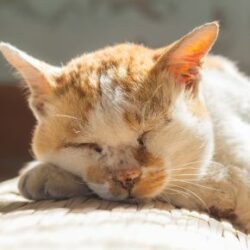Pet pain month – helping your senior cat stay comfortable
The needs of a senior cat are much different to those of their younger counterparts. Not only does their diet and exercise regime need to reflect their age, but their veterinary treatments and their daily care must also adapt to ensure they are kept comfortable and healthy during their twilight years.
For Pet Pain Awareness Month, Veterinary Surgeon Scott Carpenter at Estcourt Vets has highlighted below the main health concerns that start to affect older felines, along with ways that owners can help them to age well. To ensure your cat is in good condition, book an appointment with our experienced veterinary team. This will help to establish a baseline to work from as your cat ages.
Book a senior cat consultation
Senior cats – how to know when they need extra help
As a general rule, our team at Estcourt Vets recognise cats as geriatric/senior when they reach 7 years of age. Depending on their breed and lifestyle, this number can fluctuate but it is usual that at this stage in a cat’s life, we start to see a number of physical and behavioural changes day-to-day:
- Muscle loss – If your senior cat loses muscle mass, it may make them weak and less agile.
- Weight gain – Your cat’s metabolism slows down the older they get. Pair this with a less active lifestyle and your cat’s weight will start to increase.
- Joint pain – Cats suffering from joint pain will be reluctant to move around, meaning they will also experience muscle loss and weight gain as a direct result of this.
- Sensory changes – Vision and hearing loss become more common the older your cat becomes. This makes it difficult to assess their surroundings and continue their usual daily activities.
- Cognitive decline – Your senior cat may start to become confused or restless, both signs of feline cognitive dysfunction. This feline dementia can then add to the behavioural changes.
- Changes in habits – As an owner, it is important you recognise the changes your cat requires as they age. They may need more sleep than they used to and more/less food depending on their lifestyle. As well as becoming less active, they may also become less sociable, becoming withdrawn in situations their younger selves would have been inquisitive in.
The above changes can often be signs that your senior cat may be starting to develop underlying health conditions. Booking them in for a senior cat consultation allows us to examine them for things like dental disease, obesity, diabetes, heart disease, and kidney problems.
A vet health check will also help you tailor your cat’s daily routine, nutrition, and lifestyle for a healthy but slower lifestyle.
Updating your cat’s environment
Scott recommends that as your cat becomes stiffer and less agile, you should adjust their living environment to increase their comfort levels. Depending on what your cat is used to, as they’re all different, you may need to consider:
- Litter trays with lower sides will allow your cat to comfortably get in and out.
- Putting food & water bowls on a slightly raised platform means less strain on their neck.
- Beds and hidey places at lower levels reduces the need for climbing & jumping.
- Radiator beds and beds by a fire (away from draughts) will be kinder on your cat’s joints.
- Baby gates may deter your cat from going up and down flights of stairs.
- Keeping windows closed or locked open slightly reduce the risk of your cat falling out.
- Replace any hard/sharp grooming tools with a soft brush for a gentler experience.
Book your senior cat an appointment with Scott or any of our experienced cat vets today and we can get your ageing cat the specific care they need.
Book a senior cat consultation
< Back to articles Estcourt Vets Devizes
Estcourt Vets Devizes